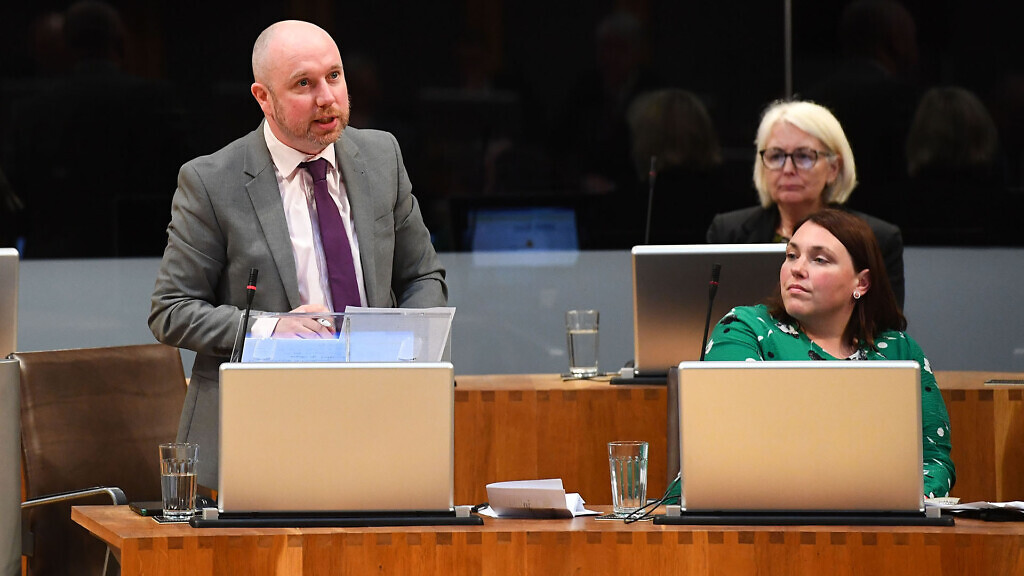Plaid Cymru’s spokesperson for health, social care and housing explains why devolution has worked and what is needed to solve the NHS personnel crisis in Wales.
Mabon ap Gwynfor, member of the Senedd for Dwyfor Meirionnydd and Plaid Cymru’s spokesperson for health, social care and housing, talked to Healthcare Today about what the healthcare priorities for Wales should be, how technology could help with the healthcare disparity between rural and urban areas of Wales, and why he believes the possible closure of Cardiff University’s nursing programme is an issue of national concern.
There is clear pressure on the NHS. What should be the funding priorities for Wales?
The NHS will always require substantial funding because medical advancements continually introduce new treatments, drugs and technologies. These innovations come at a high cost. The current system primarily focuses on treating illness rather than promoting health. In Wales, and indeed much of the UK, what we have is not a National Health Service but a National Illness Service. The emphasis has been on allocating funds to frontline care – hospitals and secondary care – rather than prioritising prevention.
This is not how it should be.
Instead, we need to redirect our focus and resources toward preventative healthcare. By investing in prevention, we can address health issues before they develop into more serious conditions, ultimately reducing the strain on frontline services. Of course, I acknowledge that this shift will not be immediate or without challenges. But once this balance is achieved, we will see a more sustainable system – one where less funding is needed for reactive care because fewer people are becoming seriously ill in the first place.
“I am deeply concerned that Cardiff University’s proposed announcement will have a detrimental impact on patient outcomes in Wales and, more broadly, on the health of our nation.”
The BMA’s Welsh GP committee voted to accept the revised 24/25 contract offer last week. Can the government afford to do this?
To fully appreciate the challenges facing the NHS, we must recognise that its workforce is fundamental to the delivery of healthcare. If doctors, nurses, and allied health professionals are not valued and fairly compensated, they will leave. This has serious consequences – not only for the healthcare system itself but, more importantly, for the patients who rely on it. The question, then, is not whether we can afford to pay healthcare professionals what they deserve, but rather whether we can afford not to.
However, the issue extends beyond pay. While fair wages are crucial, many healthcare workers – particularly in nursing – are not leaving the profession entirely; they are simply moving to agency roles or the private sector, where they receive better contracts, improved professional development opportunities, and more flexible working hours.
The NHS still operates under contractual and organisational frameworks rooted in the 1970s. This is evident not only in employment practices but also in outdated approaches to digitisation and service delivery. If the NHS is to remain effective and sustainable, it must undergo modernisation across multiple fronts. This is not merely a managerial issue; it is a political one. Real change requires leadership and vision at the highest levels of government to ensure that the NHS is fit for the future.

How much does the announcement from Cardiff University about the possible closure of its nursing programme concern you?
I am deeply concerned that Cardiff University’s proposed announcement will have a detrimental impact on patient outcomes in Wales and, more broadly, on the health of our nation. While Cardiff University operates as an independent institution, the Welsh government relies on universities to support essential training programmes, including medical and nursing education. It is, therefore, the government’s responsibility to ensure that crucial courses – such as Cardiff’s nursing school – continue to operate.
Wales cannot afford to remain dependent on recruiting nurses from overseas for the next 25 years. We must focus on training and developing our own workforce. Cardiff University’s nursing school is one of the most respected in the UK – ranked among the top five – and its closure or downsising would significantly hinder our ability to train the number of nurses needed to sustain our healthcare system.
So far, the government has completely distanced itself from the issue, despite its significant financial role in higher education. The government funds universities, contributes to student fees, and provides financial support to nursing students. Given this level of involvement, it should have a say in ensuring that a programme as vital as Cardiff’s nursing school continues. It is not enough to stand by.
“We cannot afford to leave people behind. Every household and community must have access to modern digital services.”
What concrete policies do you think are needed to solve the personnel crisis in the NHS in Wales?
When discussing the need for more healthcare staff, it is essential to consider both recruitment and retention. The Welsh healthcare system is losing staff at an alarming rate, and before looking outward to bring in new workers, the priority should be to keep the skilled professionals already in place. To do this, policies must be developed that modernise employment contracts, ensuring they offer nurses the flexibility they need.
This issue is particularly pressing in nursing, where over 90% of the workforce is female. Regardless of personal views on gender roles, the reality is that women still take on the majority of caregiving responsibilities in society and until there is a significant cultural shift where men share these responsibilities equally, healthcare contracts must reflect this reality by providing nurses with the flexibility necessary to achieve a work-life balance.
At present, many nurses in Wales work far beyond their contracted hours, accumulating millions of unpaid hours annually. Due to the nature of their job, nurses cannot simply walk away at the end of their shift; they stay to complete their duties, often without pay. Their contracts must be updated to acknowledge these demands and provide the necessary structural support.
Beyond flexibility, nurses must also be given opportunities for continuous professional development within their working hours. This would allow them to maintain their licenses, enhance their skills, and see a clear path for career progression. The government must ensure that contracts not only provide fair pay but also demonstrate genuine appreciation for the workforce. In some hospices and private care homes, nurses sometimes accept lower wages in exchange for better contracts with improved working conditions. This demonstrates that pay, while important, is not the sole factor in retaining staff – better working conditions and career development opportunities are just as crucial.

Can technology help reduce the gap?
In the past year, there has been a great deal of discussion about artificial intelligence (AI), and while some concerns are understandable, I am genuinely excited about the potential AI holds for the healthcare sector. In particular, AI could revolutionise diagnostics, especially in fields like cancer detection.
I recently attended the European Council summit in Brussels, where I was part of a panel discussing the rollout of a new European cancer app. The concept is simple but powerful. Patients would have an app where they can store and manage their own health information, deciding who has access to it. For example, if a patient suffers from shortness of breath or joint pain, they could document these symptoms in real time. With patient consent, this data could be shared with healthcare professionals, enabling them to track patterns and detect potential health concerns earlier.
We are now exploring the possibility of adopting this system in Wales, ensuring that patients here have access to the same technology.
Beyond individual patient care, AI could analyse data from thousands – or even millions – of users, identifying trends and correlations that might otherwise go unnoticed. This would not only streamline diagnosis and prognosis but also ease the burden on GPs and hospitals, freeing up valuable time and resources. Some countries are already leading the way in this digital transformation. Estonia, for instance, has successfully integrated digital healthcare into its national system, and Finland has been digitising medical records since the 1970s.
Meanwhile, in Wales, we are still relying on fax machines and paper records.
The potential benefits are immense – better efficiency, improved patient outcomes, and a more sustainable healthcare system. This is where we need to be heading, and we must act now to make it a reality.

Can technology help with the healthcare disparity between rural and urban areas of Wales?
Technology is undoubtedly one of the key solutions to improving healthcare, and we already have tools at our disposal that could be better utilised. Telemedicine, for example, has proven to be highly effective in rural areas of France, the US, and other countries. However, in Wales, it has yet to be fully implemented and used to its maximum potential. To improve healthcare accessibility, we must make better use of the technology already available to us.
However, there is another pressing issue – digital connectivity. In many parts of Wales, particularly in my constituency, there are numerous black spots where fibre broadband has not yet reached households and mobile phone signals are unreliable or non-existent. This digital divide presents a major barrier to implementing telemedicine and other modern healthcare solutions.
The situation is set to become even more urgent as BT prepares to switch off copper phone lines, meaning that broadband and phone services will soon rely entirely on fibre connections. Yet, many communities in Wales still lack the infrastructure, leaving them at risk of being further disconnected.
We cannot afford to leave people behind. Every household and community must have access to modern digital services. Ensuring universal connectivity is not just a matter of technological progress – it is a fundamental issue of healthcare equity.
“Currently, primary care, particularly GP services, receives a significantly reduced portion of the health budget compared to a decade ago, despite handling over 90% of patient interactions.”
Can community involvement and local solutions pick up some of the slack?
Before devolution, when decisions were centralised at the UK level, policymaking was viewed almost exclusively through the lens of London, often failing to consider the unique dynamics and needs of communities across the country. Devolution has helped address this imbalance.
True progress, however, must come from the bottom up, driven by the voices of local communities rather than imposed from above.
A stark example of this failure occurred in 2013 when the health board in North Wales introduced a program called Healthcare in North Wales is Changing. The plan aimed to close several community hospitals and implement what was termed a “hub-and-spoke” model. While the concept may have sounded reasonable in theory, in practice, it was one designed by individuals familiar with healthcare provision in urban areas, with little understanding of the realities of rural Wales.
This disconnect became glaringly obvious during a Q&A session with a senior member of the health board who admitted that “we haven’t figured out rural Wales yet”. And this was at the final stages of implementing the policy!
This is why we must listen to the voices of rural Wales. We need to understand what works and what does not, what local communities fear, and what they welcome. Policies should be developed in collaboration with the people they affect, rather than imposed on them by decision-makers who do not fully grasp the challenges of delivering healthcare in rural areas.

What would be your healthcare priorities for the next two years?
While preventative measures are crucial for long-term health outcomes, addressing the immediate crisis of NHS waiting lists requires a more immediate focus. It is a symptom of deeper problems within the healthcare system.
Two critical areas that need immediate attention are primary care and social care. Currently, primary care, particularly GP services, receives a significantly reduced portion of the health budget compared to a decade ago, despite handling over 90% of patient interactions. This underfunding necessitates increased investment in GP services, including improved GP contracts that allow for more patient time and the recruitment of 500 additional GPs over the next two terms.
Social care, often neglected and underfunded, is another crucial aspect. Social care workers are significantly undervalued, with limited career progression and inadequate compensation. This needs to be addressed to attract and retain qualified professionals. Furthermore, the immense contribution of unpaid carers, valued at approximately £8 billion annually in Wales, must be acknowledged and supported.
By addressing these two critical areas, we can effectively address the root causes of the waiting list crisis and improve the overall health and well-being of the Welsh population.



